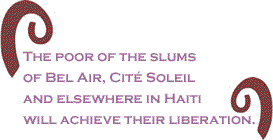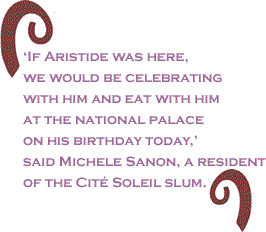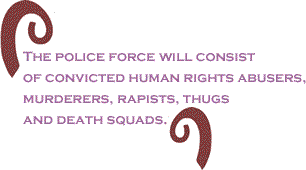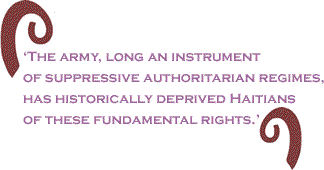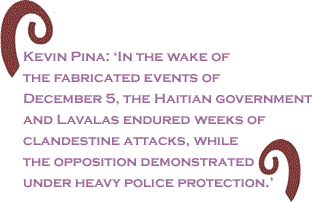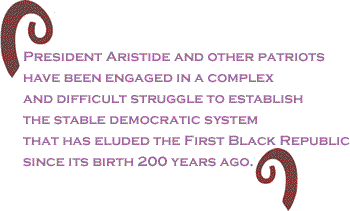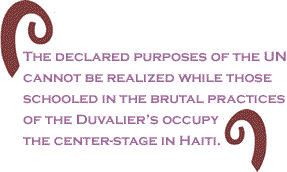
|
|||||||||||||||||||||
 |
The following essay originally appeared in the journal of the African National Congress (ANC) of South Africa. There was another important July birthday that passed in our country without public notice. But not so in Haiti, where thousands of people took to the streets bearing placards carrying the words – “Bonne Féte President Titid” – Happy Birthday President Titid. The birthday demonstrators also demanded the return of Titid – President Jean-Bertrand Aristide, an honored guest in our country. Titid, “little Aristide,” is the affectionate Creole nickname given to President Aristide by the poor of his country. He quietly celebrated his 51st birthday in our country on July 15.
Where our people did not join him in these celebrations because they did not know it was his birthday, the people of Haiti did not forget. But they could not join him because circumstances had taken him and his family far away from his beloved motherland. On July 15, CNN reported that, “Aristide supporters, singing ‘happy birthday,’ marched with empty plates and spoons to show they were hungry. ‘If Aristide was here, we would be celebrating with him and eat with him at the national palace on his birthday today,’ said Michele Sanon, a resident of the Cité Soleil slum.” Reuters reported that on the very day that President Aristide quietly celebrated his 51st birthday and the slum dwellers marched in protest at his absence, gunmen killed two policemen in Haiti's capital, Port-au-Prince, having fired on a group of police officers standing in the street. The authorities said the attack was politically motivated.
Port-au-Prince Police Commissioner Harry Beauport said, "We firmly believe the police are being targeted, because we have noted a series of attacks against our policemen, several of them deadly.” The news agency said, “With rebel forces still in control of many areas of the country, tensions between police and rebels have been rising in recent weeks. Rebel leaders have criticized government plans to disarm their soldiers, a move that would leave Haitian police and United Nations peacekeepers in charge of security in the country. The rebels, many of whom are former members of the Haitian army disbanded by Aristide in the mid-1990s, have demanded the creation of a new army.” As much as they did not know of President Aristide’s birthday, our people will be ignorant of all this and much else that is happening in Haiti. They will not have had access to the June 21st article written by a Haitian, Lucson Pierre-Charles, entitled “Haiti After the Press Went Home: Chaos Upon Chaos.” Evidently the US and other journalists, who had come to Haiti in the period preceding the removal of President Aristide on February 29th, went home soon after the President was taken out of his country.
“According to that statement, the situation in Haiti remains unpredictable and potentially dangerous despite the presence of foreign security forces. This warning followed a report issued in early May by the United Nations reaching a similar conclusion.” He continues, “The security apparatus is on the verge of collapsing due to the proliferation of small arms, the mere presence of the heavily armed rebels and Aristide loyalists, the increasing gang activities, the rampant rise in kidnappings and the release of 3,000 prisoners by Guy Philippe and his squads following the ouster of Mr. Aristide. Some of the rebels will be integrated into the police force despite the fact that they killed a great number of policemen and burned down police headquarters in the lead up to the coup. “In most parts of the country, they appointed themselves as mayors, police chiefs and judges. (One report says 6,000 elected officials have been removed and replaced by self-appointed individuals.) Under Mr. Aristide’s leadership, the police force was often criticized for being too heavily politicized. Under (the) technocratic administration (installed after the removal of President Aristide), the police force will consist of convicted human rights abusers, murderers, rapists, thugs and death squads who have committed some of the worst atrocities during the first coup in 1991.” On May 4th, a 9-person Labor/Religious/Community Fact-Finding Delegation visited Haiti. Sent by the San Francisco Labor Council, it included US and Canadian trade unionists, religious leaders and human rights activists. It reported that:
A US human rights activist and College Professor who has been visiting Haiti since 1977, Tom Reeves, wrote on May 5, “The very same para-military and former Army officers who terrorized Haiti during the previous (1991) coup are doing so today. Their victims are mostly the poor and their popular organizations who supported (and still support) President Aristide and Fanmi Lavalas. We interviewed many of these victims who said they recognized their tormentors (and in one case rapists) as the same men who had victimized them a decade ago. Among those terrorizing Haiti today are many common criminals who were let out of the National penitentiary by the ‘rebels,’ as well as major convicted human rights abusers and mass murderers like Jodel Chamblain and Jean ‘Tatoune.’” The “previous coup” to which Reeves refers took place in 1991, when the Haiti military seized power and forced the elected President Aristide into exile. The then US government, opposed to unconstitutional changes of government, assisted him to return to power in 1994. On resuming his term as President, he dissolved the Army, leaving the civilian police to be responsible for national security. Oscar Arias, the former President of Costa Rica, was awarded the Nobel Peace Prize in 1987. Disturbed by the reappearance of the soldiers who had carried out the 1991 coup d’etat, and the demands that the Haitian army, dissolved in 1995, should be reconstituted, he spoke out on March 15.
He observed that one Guy Philippe had been quoted by The Washington Post saying, "I am the chief, the military chief. The country is in my hands." Arias wrote:
Guy Philippe was a death squad leader under the Duvaliers and a member of the FRAPH we mention below. He was taken into the police when the army was dissolved in 1995. Human Rights Watch says that police under his command summarily executed people they arrested. Discovered to be planning a coup d’etat in 2000, he fled to the neighboring Dominican Republic. Here he linked up with other killers of the Duvalier period, including Louis Jodel Chamblain, Jean Pierre Baptiste, who calls himself General Tatoune, and the leader of the 1991 coup d’etat, Emmanuel ‘Toto’ Constant. Of Chamblain and Baptiste, the February 29 edition of the “San Francisco Chronicle” (SFC) said Chamblain is “a former army officer who later headed the Front for the Advancement of the Haitian People or FRAPH, a paramilitary organization responsible for thousands of murders of Aristide followers in the early 1990s. “Baptiste and Chamblain were convicted in absentia for massacring 25 Aristide supporters in a seaside slum known as Raboteau in the northern city of Gonaives in 1994.” As he and his fellow “rebels” marched on Port-au-Prince in February, Chamblain, as quoted by the SFC, said: “The army was demobilized. Now the army has been remobilized and is a constitutional army. Aristide has two choices: prison or execution by firing squad.” Concerned at what might happen when they succeeded to overthrow the democratic government of Haiti, Deputy Director of the Americas Division of Human Rights Watch, Joanne Mariner, said: “These men, notorious for killings and other abuses during the military government, must not be allowed to take violent reprisals against government loyalists.” The SFC also reported that while Guy Philippe served in the leadership of the Haiti police, he and his colleagues from the former Duvalier army “began collecting bribes for the drugs that easily pass through this nation of 8 million people. Internal reports from foreign observers found that the ‘Latinos’ routinely gave gifts to politicians and once squeezed the government into exiling its former inspector general after the seizure of more than three-quarters of a ton of cocaine implicated the men.”
It is no wonder that Tom Reeves even in 2003, after Philippe and others had started their violent campaign against the Aristide government, could quote a young man of Cap-Haitien as saying, "It's the army I really despise. At least now I can sit here with my friends and complain. Under the military, I would be shot. When I saw Himmler leading the demonstration by the Convergence last November, I was really scared." Reeves wrote that, “The aptly named Himmler is Himmler Rebu, a former army officer who has been involved in several coup attempts.” Those, like Rebu, who prepared the putsch that led to the removal of the government of Haiti in 2004, carried out a violent provocation at a university on December 5, 2003, which they proceeded to blame on Lavalas. The US journalist and documentary filmmaker, Kevin Pina, Associate Editor of “The Black Commentator” wrote:
Michele Sanon, who demonstrated in Port-au-Prince on July 15 to celebrate her President’s birthday and demand his return, carrying an empty plate and a spoon, is part of “the great silent beast of Haiti’s poor” of which Pina wrote. She, like many among Haiti’s urban and rural poor, see President Aristide as their very own Titid.
One other of her Lavalas leaders is Annette Auguste, who was arrested on May 10, on the pretext that she was involved in the December 5 events. She sent out a message on May 23 from Pétionville Penitentiary, where she was detained. For us, her words recall a time, which is not so long ago, when we too had to fight for our liberation. She wrote:
Annette Auguste’s moving message draws attention to the real nature of the struggle in Haiti, which the working people of that country, the slum dwellers who demand the return of President Aristide, understand very well. From his election in 1990, President Aristide and other patriots have been engaged in a complex and difficult struggle to establish the stable democratic system that has eluded the First Black Republic since its birth 200 years ago. They have also sought to ensure that this new democracy should address the interests of the majority of the people, the black urban and rural poor. An adherent of Liberation Theology, together with such outstanding progressive thinkers within the Roman Catholic Church as Helder Camara, Gustavo Gutiérrez, Oscar Romero, Ernesto Cardenal and Erwin Kräutler, President Aristide would have been inspired by such Biblical teachings as:
Opposed to the related political and social outcomes President Aristide sought are sections of the population of Haiti, which have historically been the beneficiaries of successive systems of dictatorship that have guaranteed the privileges of the few and the impoverishment of the many, keeping the mighty in their seats and subjugating those of low degree. The privileged few have consistently depended on state repression to protect this social order, as Oscar Arias said. The Duvalier regimes of “Papa Doc and Baby Doc” developed this repression into open state terrorism against the masses of the people, relying on the police, the Army that was disbanded in 1995 and the “tonton macoutes.” Agents and practitioners of the Duvalier state terrorism led the counter-revolution of 2004, which resulted in the overthrow of the Aristide government. The central purpose of the counter-revolution is to halt and reverse the long-delayed democratic revolution in Haiti, guarantee the positions of the privileged few, and ensure the continued oppression, disempowerment and impoverishment of the millions of poor Haitians. In many respects, the 2004 counter-revolution in Haiti was not dissimilar to the counter-revolution in Chile in 1973, which resulted in the overthrow of the Allende government, the death of the President, and the installation of the Pinochet military dictatorship. In his July article, “Haiti’s Cracked Screen: Lavalas Under Siege While the Poor Get Poorer,” Kevin Pina described Haiti today in the following terms:
On February 29th, the day President Aristide was flown out of his country, the UN Security Council adopted a Resolution on Haiti. Among other things, it decided to establish an intervention force and directed this UN contingent to:
What was and is strange and disturbing about this Resolution is that it is totally silent on the central issue of the unconstitutional and anti-democratic removal of the elected Government of Haiti. It says nothing about the notorious figures who achieved this objective, arms in hand, killing many people.
Seemingly to avoid the obligation to disarm and punish those who took up arms against a democratic government, it even directed that the UN forces should discharge these obligations “as circumstances permit.” However, it is perfectly obvious that a safe and secure environment in Haiti, respect for human rights, and a return to constitutional legality cannot be achieved without defeating the criminal forces of counter-revolution that necessitated the deployment of UN troops and other international interventions. The declared purposes of the UN cannot be realized while those schooled in the brutal practices of the Duvalier’s occupy the center-stage in Haiti. The UN will not achieve its goals if it does not guarantee the safety and security and the democratic rights of the leaders and members of Fanmi Lavalas, other democrats and the poor of Haiti who demand democracy and development. Time will tell whether the UN is ready and willing to live up to its obligations to the poor of Haiti, as well as respect the binding principles contained in its Charter and the Declaration of Human Rights. Time will tell whether what Oscar Arias warned against will be avoided – the destruction of “the seeds of peace and self-rule that have been planted with great sacrifice by the Haitian people.” What has been allowed to happen in Haiti After the Press Went Home raises serious concerns in this regard. As the African slaves of Haiti fought for their liberation more than two centuries ago, among other things the counter-revolution opposed to the French Revolution tried hard to restore the slavery in Haiti that Jacobin France had abolished, propelled by the heroic struggle of the risen slaves. At that time, the outstanding leader of the revolutionary African slaves, Toussaint L’Ouverture, wrote to the French Directory and, speaking of the counter-revolution, said:
Annette Auguste has sent the same message to the counter-revolution of 2004. In her heart burns the same unquenchable desire to build “a Haiti where the poor are not simple tools upon which to build dreams of personal empire and wealth,” which inspired her forebears to defeat the mighty European powers and establish the First Black Republic. The risen slaves achieved their liberation even though their brilliant and renowned leader, Toussaint L’Ouverture, was imprisoned far away in a French jail. The poor of the slums of Bel Air, Cité Soleil and elsewhere in Haiti will achieve their liberation even though their brave and beloved leader, Jean-Bertrand Aristide, is an honored guest far away in South Africa. Knowledge of that past, and this future, was the best birthday present that Titid received, to celebrate his 51st birthday. Bonne Fête President Titid. |
July
29 2004 |
|||||||||
|
|||||||||
|
|
|||||||||
| Printer Friendly Version | |||||||||
 |
|||||||||
| |
|||||||||
| |
|||||||||





















